The rules for executing a Will in Pennsylvania are simple and clear. Unfortunately, life, and its circumstances, often are not, and these circumstances can unwittingly lead to a Will contest.
If someone signs a document which is intended to dispose of property or other legal rights upon the author’s death, and it is signed at the end, the document is a Will. There is no legal requirement for the Will to be witnessed at the time it is signed for the document to be a valid Will. If two witnesses sign the Will at the time of execution, they are known as “subscribing witnesses.” If the author of the document, the “testator”, then signs an acknowledgement before a notary, and the subscribing witnesses sign an affidavit before a notary, the Will is “self-proving.” A self-proving Will is easily admitted to probate. Consulting a will lawyer near you could make this process easier for you.
If a Will is not self-proving, the Register of Wills will require the testimony of witnesses, who must authenticate the Will, before it is admitted to probate. Most often, this testimony comes in the form of an affidavit. If a subscribing witness offers testimony, an “oath of subscribing witness” must be filed with the Register of Wills. If a non-subscribing witness offers testimony, the non-subscribing witness must verify that the witness (a) is familiar with the signature of the testator/decedent, and (b) recognizes the signature of the testator/decedent. A subscribing witness must only state that the subscribing witness signature on the Will is that of the witness.
Pennsylvania law recognizes that some people may not be able to sign their own name. Therefore, it provides another person may sign the testator’s Will on the testator’s behalf, or that the testator may merely make a mark indicating the testator’s consent to the Will. As you may imagine, the standard of proof in these cases, must be higher than that of a full and complete signature by the testator. In these cases, Pennsylvania law requires there be two subscribing witnesses to verify the signature by mark, or by another.
Recently, these provisions of Pennsylvania law were tested in the case of In Re: Staccio, 143 A.3d 983 (Pa. Super. 2016). In this case, the decedent was very weak and sick, and the decedent’s girlfriend helped him make his signature. This act was done in the presence of the testator’s attorney. The testator’s attorney offered testimony that the testator was fully aware of his actions and the consequences of signing the Will. The attorney, however, was the only subscribing witness to the Will. In this case, the Superior Court held that a person who signs a Will, even with assistance of another person, does not need to meet the higher threshold imposed upon those who signed via mark or who are having their Will signed by another. It is important to note that the court found that the testator was aware, and asked for help in signing the Will. The testator did not ask his girlfriend to sign the Will on his behalf.
Although the Court upheld the execution of the Will, the Court left open the questions of whether or not the testator was under the undue influence of his girlfriend, and whether his illness caused him to lose his testamentary capacity. The bottom line of the Court’s decision was that a sick adult with testamentary capacity, can sign a Will while receiving assistance from another person while signing a Will.
A properly executed Will makes the probate process far simpler . . . and less expensive. It is important to review your estate planning documents regularly, to ensure that they still meet your needs…and were properly signed. It's important to contact a will lawyer near you to assist.
